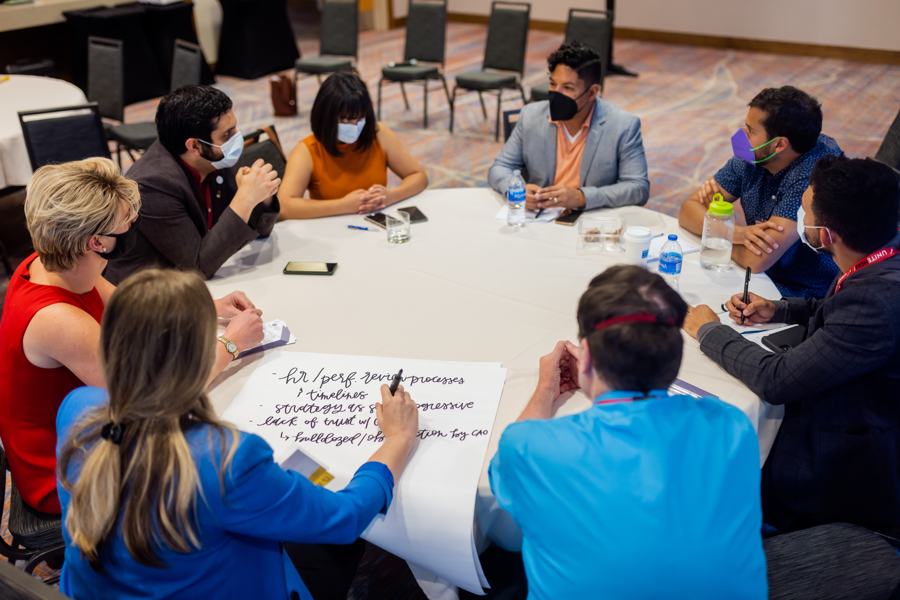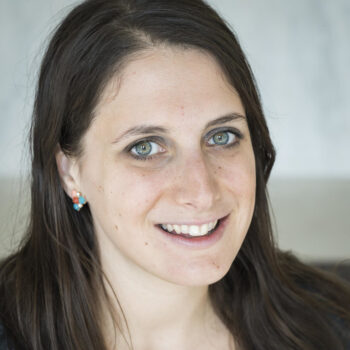This interview is part of a series of articles from The Forge and New America spotlighting successful stories of co-governance models across rural, urban, and tribal communities.
Collaborative governance — or “co-governance” — offers a model for shifting power to ordinary people and re-building their trust in government. Co-governance models break down the boundaries between people inside and outside government, allowing community residents and elected officials to work together to design policy and share decision-making power. Cities around the world are experimenting with new forms of co-governance, from New York City’s participatory budgeting process to Paris’s adoption of a permanent Citizen Assembly. More than a one-off transaction or call for public input, successful models of co-governance empower everyday people to participate in the political process in an ongoing way. Co-governance has the potential to revitalize civic engagement, create more responsive and equitable structures for governing, and build channels for Black, brown, rural, and tribal communities to impact policy-making.
Still, co-governance models are not without challenges. The hierarchical and ineffective nature of our current governing structure is difficult to transform. Effective collaboration between communities and politicians requires building lasting relationships that overcome deep distrust in government. So far, successful models of co-governance tend to be local and community-specific — making it critical that we share stories of success and brainstorm ways to scale.
New America’s Hollie Russon Gilman and Lizbeth Lucero spoke with Sarah Johnson, executive director of Local Progress, a non-profit organization that works with local elected officials to build power for underrepresented communities at the local level. We talked about the growing leadership of women and people of color across the country, Local Progress’s approach to organizing in suburban and rural areas, and why relationships are so important to building power. The interview has been edited and condensed.
How are you thinking about building civic power at this moment, especially with communities disproportionately impacted by systemic inequality?
Local Progress is a national network of 1,300 elected officials at the city, county, and school board levels working to advance racial and economic justice. We are in the midst of a tremendous sea change in who governs our communities at the local level. We are seeing historic waves of folks elected as the first woman or person of color to hold office in their communities. When we held our national convening of members this summer, we asked the elected officials, “What’s your vision for this political movement in ten years?” Gabriela Santiago Romero — a community organizer from We The People of Michigan who was elected to the Detroit City Council — envisioned that, in ten years, we no longer celebrate “firsts” because underrepresented communities will soon become the governing majority. She noted that even at the local level, the demographics of elected representation have significantly fallen short of a truly reflective democracy.
Our work at Local Progress is deeply centered on the leadership of women and people of color moving into governing roles. Over half of our active members are women and over half are people of color, which is not what you find in local elected bodies writ large. A big part of our mission is focused on how to help folks who are coming from communities disproportionately impacted by systemic disparities move into leadership positions. We also focus on working with elected officials to engage and center the people most impacted by governing decisions made in the policymaking process. The core of our theory of change is to move beyond a version of civic engagement that re-establishes existing status hierarchies and towards a model of engagement that builds civic power. Both representation and civic engagement need to be enhanced if we are going to fundamentally change how we govern in this country.
How do we highlight what is working and also the limitations that exist for people who are trying to build power in their communities?
I think one of the areas the broader progressive movement is not paying enough attention to is how to capture the changing demographics of suburban areas and small towns, including how to leverage civic power and accountability in these places.
We had an amazing panel at our conference about how city management is often a very challenging system for elected officials and community members to have a real democratic impact because power is often consolidated within individual people. Eddy Morales, a Local Progress board member and City Council President in Gresham, Oregon, shared about the demographic shift in his community, which became close to majority people of color. But the entire City Council at the time was white, and the whole city enterprise was essentially an old-guard establishment. Eddy ran for City Council and won, unseating the long-term incumbent City Council President. He also helped run a slate of candidates both in Gresham and the broader Portland metro area to change who was at the table for different municipalities and school boards. He instituted a management system to figure out how to move the city bureaucracy to be more accountable to the elected officials. This move involved a culture shift and created greater oversight focused on the role of the City Manager, which is primarily HR and implementation of the work plan established by the City Council. Above all, he found new ways to exercise the levers of power and accountability now available to him as an elected official. It can be easy for newly elected officials to see the things that are out of their control and feel discouraged, but they can use levers like appointments and oversight to build new systems of power for communities.
I think suburbs and smaller towns are challenging but also fertile places for innovation and progress. It’s a very different thing to try and reimagine public safety in a small town with a police department of 40 officers than it is in a larger city with 7,000 officers. There is a lot that becomes possible in places that are smaller where people can organize, build power, and bring communities into the process. The progressive movement too often ignores these places, which do present challenges but also significant opportunities.
Are there any lessons you’ve learned from efforts with smaller communities?
A lot of political and narrative work in this country holds big cities as progressive outliers. But we have found from our organizing that people are fighting for a better future everywhere. They want to be part of something bigger, and they don’t want to be doing it alone. In the weeks following the Supreme Court decision that overturned Roe v. Wade, we saw half a dozen municipalities in Texas pass the GRACE Act, a law that says city funds shouldn’t be used to investigate reports on abortion and the local police should make investigation a low priority. This passed in places you might expect, like Austin, San Antonio, and Dallas, but also in places like Denton, Texas. Denton was actually the first municipality to pass the act, with a local council member leading the initiative. We also introduced it in El Paso and in Waco, where it failed but there is momentum to push for it again. But the main lesson here is that we need to have these fights everywhere and anywhere across the country—even in areas where we think we might not win. We use these fights to build power and resist the ways in which broader culture wars make assumptions about where progress can and can’t happen.
I’ve also been thinking a lot about the local level in relation to the federal level at the current political moment. Obviously, we should be fighting for change at the federal level. Winning at the national scale has an enormous impact and unlocks the ability for states and localities to do so much more. But localities are particularly important at this moment when we might be able to eke out incremental wins in local communities, even if we are structurally disempowered at the federal level. Let’s control the institutions we can control and then use all of their power to build some semblance of inclusive, multiracial, democratic participation — and fight for state and federal power.
What are the changing roles of cities and civic engagement in places like Orlando or Kingston or Saint Paul?
I started at Local Progress in 2015 and it was an emerging time when we began to think about transforming municipal government and shifting our ideas of what was possible. I think things like the fight for a $15 minimum wage opened people’s imaginations about what could be accomplished at the local level. People realized that local governments are more than just municipal services and can be inclusive places that reflect the needs and interests of our communities. The Trump era had a significant influence on how people thought about national issues, and the sanctuary cities movement showed there was a local way to fight back. Take a city like Austin, where we’ve seen so many amazing progressive wins over the past decade — I think ten years ago people in Austin thought the role of city government was to approve liquor licenses and zoning variances.
There’s been a lot of talk, especially in the housing discourse, about how civic engagement is flawed and can end up entrenching certain privileges. But the conclusion that we should throw out civic engagement altogether is not effective. For example, a community task force can be a terrible tool the government uses to stall progress on an important community demand. Or it can implement a meaningful engagement process that builds consensus and centers people who are crucial for that conversation.
Our work is challenging because structural interventions that are designed to help could actually do harm, depending on how you use them. For example, Local Progress doesn’t have opinions about the best universal municipal election system. But we do believe that every decision we make has to be grounded in asking where we are now, what we’re trying to achieve, and whether this is the right system to get us there. That is, we could do more work to evaluate the pros and cons of different forms of government, but the important thing is understanding how people actually interact with and understand these forms of government and adapting something to work for them.
Are there other players who are helpful in moving this work forward?
It’s easy to think of the bureaucracy as a singular force when in fact, depending on the size of the jurisdiction, there might be a dozen or a hundred people in the bureaucracy, some of whom might share common goals and objectives as the political leadership, and some of whom might not. We work hard to support elected officials to understand the power dynamics in their jurisdictions.
There are formal ways to think about power, like who can vote for what, who controls the money, who can bring a bill forward, who implements it, and so on. I was trained as an organizer with the concept that access is not the same thing as power. But relational access, like knowing who in the organization to talk to get something approved, can be a sort of informal power, especially with an internal system like bureaucracy. We have to know how to navigate both the formal mechanisms of power and informal mechanisms of relationships and their relevance for how people operate.
Can this kind of relational work be extrapolated to other contexts?
Our members work in every type of community from Los Angeles, California to Meadville, Pennsylvania. So, we do think a lot about what works and doesn’t in different contexts. I come from doing political work in New York City and when I started doing work outside of New York, I spent the first two-to-three years just learning how nothing I learned in New York would apply anywhere else. Traditionally, our political work started out with building a coalition of labor unions, community groups, and a couple of council members. We figured if we could hold that coalition together for long enough, then we could actually take over the City Council, get laws passed, and give people jobs. That was my paradigm. When we talk about the suburbs and working in different contexts, a big part of my work recently has been about adapting this paradigm to different scales and places, where politics and government can be significantly less professionalized.
What is the approach for states where you may have small counties with candidates interested in joining Local Progress?
The way we build our state chapters is very iterative and based on energy and interest alignment from elected officials, community organizations, and other people on the ground. We are not the kind of national organization that has a 2024 political map targeting the five most important states, because we believe in fundamentally rebuilding governance from the ground up with energy and leadership that comes from communities. Our work is centered around where that energy and leadership exist. Of course, like any organization, we have to figure out how to fund that, but it is important to note that we don’t have some grand national political strategy. We think about where the most local change is possible.
Since we started Local Progress, we have been trying to figure out how to build better and more effective recruitment strategies, especially in smaller municipalities and rural areas. It’s much easier to do that where we are able to have staff in the communities. At the beginning of Local Progress, we had about five staff, three of whom were focused on specific states. Right now, we’re really experimenting. We are expanding more of our work in Texas, and because it’s really a country of its own, we have a part-time organizer who is working in its border counties. We’re also expanding our New York staff by two people to have someone focused on the metro region and the other focused on upstate. Our approach is mainly influenced by [organizational] capacity.
We would like to thank Lindsay Zafir, Mark Schmitt, Maresa Strano, Jessica Tang, and Grace Levin for their incredibly helpful comments and editing support. This would not have been possible without them.


